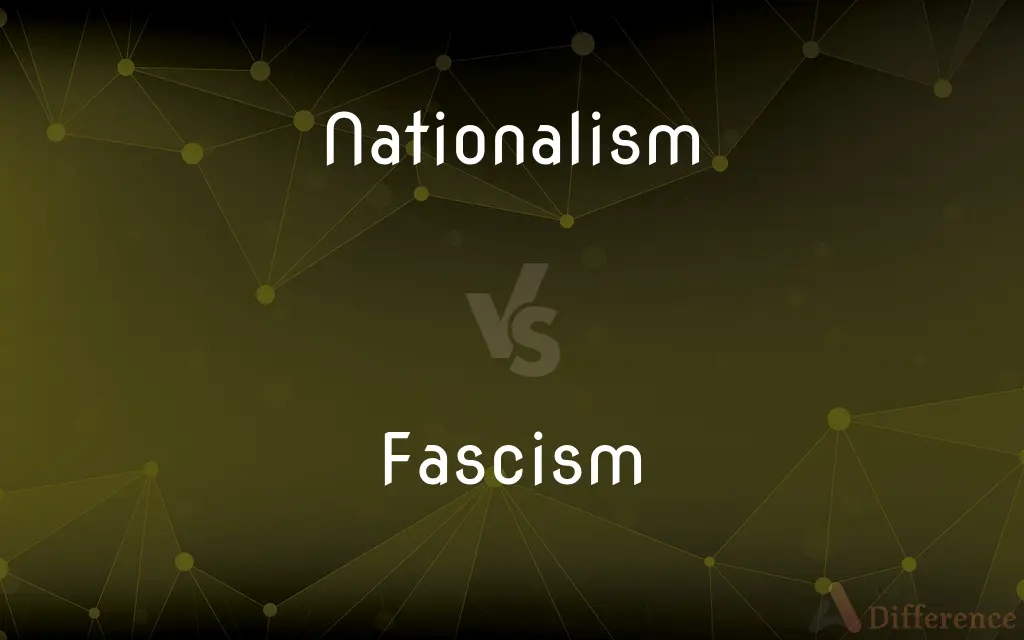Nationalism vs. Fascism — What's the Difference?
By Tayyaba Rehman — Updated on January 16, 2024
Nationalism is a political ideology focused on the promotion of a nation's interests and culture, while Fascism is a totalitarian ideology that elevates the state above individual rights, often involving dictatorial leadership and aggressive nationalism.

Difference Between Nationalism and Fascism
Table of Contents
ADVERTISEMENT
Key Differences
Ideological Focus: Nationalism centers on the belief in the superiority and interests of one's nation, often promoting cultural and national identity. Fascism, while incorporating elements of nationalism, is characterized by authoritarian power, suppression of opposition, and strong regimentation of society and the economy.
Political Structure: Nationalism can exist within various types of political systems, including democracies and republics. Fascism requires a totalitarian system where the state has complete control over every aspect of public and private life.
Expression of Patriotism: In nationalism, patriotism is expressed through pride in national achievements and culture. In Fascism, patriotism is enforced through state propaganda and is often accompanied by xenophobia and militarism.
Economic and Social Policies: Nationalism does not prescribe specific economic policies, whereas Fascism often involves state control of the economy and social engineering to align with the state's ideology.
Historical Context: Nationalism has been a driving force in various historical contexts, including independence movements. Fascism rose to prominence in the early 20th century, notably in Nazi Germany and Fascist Italy, where extreme nationalist sentiments were combined with totalitarian rule.
ADVERTISEMENT
Comparison Chart
Ideological Focus
Promotion of national interests and culture
Authoritarian power, aggressive nationalism
Political Structure
Can exist in various political systems
Requires totalitarian system
Compare with Definitions
Nationalism
Advocacy (n): Advocacy for national interests and unity.
Nationalism was a key factor in the country's independence movement.
Fascism
Totalitarian System (n): A totalitarian political system with authoritarian leadership.
Fascism in the 20th century led to oppressive regimes.
Nationalism
Independence Movement (n): Movement for national independence.
The struggle against colonialism was driven by nationalism.
Fascism
Dictatorial Power (n): A movement characterized by dictatorial power and forcible suppression of opposition.
The history of fascism shows a rejection of democratic principles.
Nationalism
Patriotic Feeling (n): Patriotic feeling or efforts.
The celebration was a display of nationalism.
Fascism
Social and Economic Control (n): A political regime that imposes strict social and economic control.
Fascism's rise in some countries was marked by the suppression of free speech.
Nationalism
National Identity (n): Ideology centered on national identity.
Nationalism emphasizes the shared history and culture of a nation.
Fascism
Nation Above Individual (n): An ideology that exalts the nation above the individual.
Fascism often involves extreme measures to maintain control.
Nationalism
Identification with one's own nation and support for its interests, especially to the exclusion or detriment of the interests of other nations
Their nationalism is tempered by a desire to join the European Union
Fascism
Authoritarian Nationalism (n): A form of radical, authoritarian nationalism.
Fascism is known for its dictatorial approach to governance.
Nationalism
Nation's Interests (n): Support for one's nation and its interests.
His speech focused on the importance of nationalism in policy-making.
Fascism
Fascism () is a form of far-right, authoritarian ultranationalism characterized by dictatorial power, forcible suppression of opposition, and strong regimentation of society and of the economy, which came to prominence in early 20th-century Europe. The first fascist movements emerged in Italy during World War I, before spreading to other European countries.
Nationalism
Nationalism is an idea and movement that holds that the nation should be congruent with the state. As a movement, nationalism tends to promote the interests of a particular nation (as in a group of people), especially with the aim of gaining and maintaining the nation's sovereignty (self-governance) over its homeland.
Fascism
An authoritarian and nationalistic right-wing system of government and social organization.
Nationalism
Devotion, especially excessive or undiscriminating devotion, to the interests or culture of a particular nation-state.
Fascism
A system of government marked by centralization of authority under a dictator, a capitalist economy subject to stringent governmental controls, violent suppression of the opposition, and typically a policy of belligerent nationalism and racism.
Nationalism
The belief that nations will benefit from acting independently rather than collectively, emphasizing national rather than international goals.
Fascism
A political philosophy or movement based on or advocating such a system of government.
Nationalism
The belief that a particular cultural or ethnic group constitutes a distinct people deserving of political self-determination.
Fascism
Oppressive, dictatorial control.
Nationalism
Patriotism; the idea of supporting one's country, people or culture.
Fascism
Any right-wing, authoritarian, nationalist ideology characterized by centralized, totalitarian governance, strong regimentation of the economy and society, and repression of criticism or opposition.
Nationalism
Support for the creation of a sovereign nation (which does not currently exist).
Basque nationalism
Kurdish nationalism
Fascism
Any system of strong autocracy or oligarchy usually to the extent of bending and breaking the law, race-baiting, and/or violence against largely unarmed populations.
Nationalism
Support for the union of Northern Ireland and the Republic of Ireland.
Fascism
Any extreme reliance on or enforcement of rules and regulations.
Nationalism
The state of being national; national attachment; nationality.
Fascism
A political theory advocating an authoritarian hierarchical government; - opposed to democracy and liberalism.
Nationalism
An idiom, trait, or character peculiar to any nation.
Fascism
An authoritarian system of government under absolute control of a single dictator, allowing no political opposition, forcibly suppressing dissent, and rigidly controlling most industrial and economic activities. Such regimes usually try to achieve popularity by a strongly nationalistic appeal, often mixed with racism.
Nationalism
National independence; the principles of the Nationalists.
Fascism
Specifically, the Fascist movement led by Benito Mussolini in Italy from 1922 to 1943.
Nationalism
A devotion to one's country; patriotism;
Fascism
Broadly, a tendency toward or support of a strongly authoritarian or dictatorial control of government or other organizations; - often used pejoratively in this sense.
Nationalism
The policy of advocating the independence of one's country.
Fascism
A political theory advocating an authoritarian hierarchical government (as opposed to democracy or liberalism)
Nationalism
The policy of advocating the interests of one's own country exclusively, regardless of effects of a country's actions on other countries.
Nationalism
Love of country and willingness to sacrifice for it
Nationalism
The doctrine that several different cultures (rather than one national culture) can co-exist peacefully and equitably in a single country
Nationalism
The aspiration for national independence felt by people under foreign domination
Nationalism
The doctrine that nations should act independently (rather than collectively) to attain their goals
Common Curiosities
Does nationalism always lead to fascism?
Not necessarily; while extreme nationalism can be a component of fascism, they are distinct concepts.
Can nationalism exist within a democratic framework?
Yes, nationalism can exist within various political systems, including democracies.
Is fascism always linked to a specific political party?
Fascism is more about the structure and ideology of governance than alignment with a specific party.
What are the dangers of extreme nationalism?
Extreme nationalism can lead to xenophobia, conflict, and disregard for international cooperation.
What is the core idea of nationalism?
It centers on promoting national interests and unity.
How does fascism differ from traditional nationalism?
Fascism involves authoritarian leadership and often suppresses individual rights for the state.
Is patriotism the same as nationalism?
Patriotism is love for one’s country, while nationalism often involves asserting superiority or interests over other nations.
Can fascism coexist with a free market economy?
Typically, fascism involves significant state control over the economy, limiting free market principles.
Share Your Discovery

Previous Comparison
Inhabitant vs. Citizen
Next Comparison
Elucidate vs. IlluminateAuthor Spotlight
Written by
Tayyaba RehmanTayyaba Rehman is a distinguished writer, currently serving as a primary contributor to askdifference.com. As a researcher in semantics and etymology, Tayyaba's passion for the complexity of languages and their distinctions has found a perfect home on the platform. Tayyaba delves into the intricacies of language, distinguishing between commonly confused words and phrases, thereby providing clarity for readers worldwide.














































